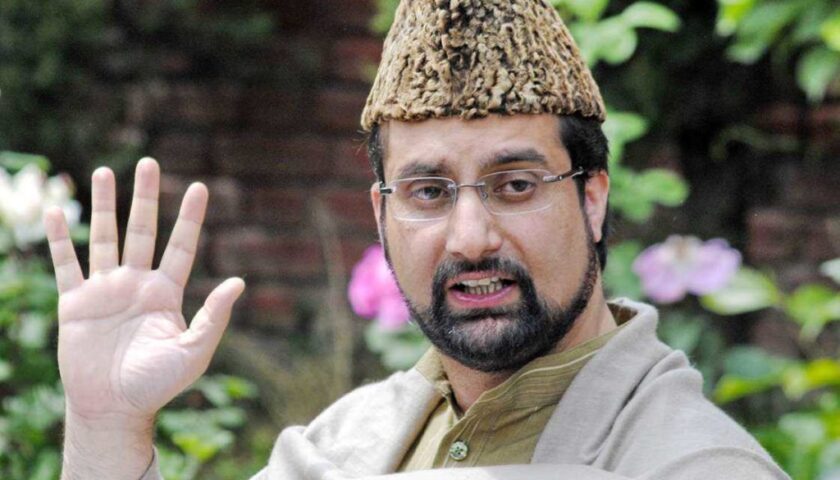Mirwaiz Umar Farooq Calls for Ban on Online Gambling, Citing Moral and Social Decay
Srinagar 26 May 2025: In a fervent appeal to the government, Mirwaiz Umar Farooq, the chief cleric of Kashmir and chairman of the Hurriyat Conference, has raised serious concerns over the escalating issue of online gambling. Addressing a congregation at Srinagar’s historic Jamia Masjid, he emphasized the detrimental impact of online gambling on the youth and the broader societal fabric.
The Rising Threat of Online Gambling
Addiction Disguised as Entertainment
Mirwaiz highlighted that online gambling, often masked as fantasy sports or skill-based games, is ensnaring the youth under the guise of harmless entertainment. Platforms like Dream11 and My11Circle have become increasingly popular, drawing young individuals into a cycle of betting and loss. The allure of quick money is proving irresistible, leading many down a path of financial ruin.
Families in Financial Ruin
The cleric shared harrowing accounts of families forced to sell their homes and assets to cover debts incurred by addicted members. Young men, in particular, are falling prey to these platforms, accumulating debts amounting to lakhs of rupees. The financial strain is not only depleting savings but also causing emotional and psychological distress within families.
Moral and Spiritual Decline
Beyond the financial implications, Mirwaiz expressed deep concern over the moral and spiritual degradation resulting from gambling. He emphasized that in Islam, gambling is strictly prohibited as it fosters greed and undermines ethical values. The societal acceptance of such practices signals a troubling shift away from spiritual and moral principles.
A Call to Action
Government Intervention Needed
Mirwaiz urged the government to take immediate and decisive action against online gambling platforms. He pointed out that several Indian states, including Telangana, Assam, Odisha, Andhra Pradesh, Sikkim, and Nagaland, have already implemented bans on such apps. He called for similar measures in Jammu and Kashmir to protect the youth and uphold societal values.
Judiciary’s Role in Banning Online Gambling
The cleric appealed to the judiciary to recognize the severity of the issue and enforce a legal ban on online gambling. He stressed that without judicial intervention, the problem would continue to escalate, causing further harm to individuals and communities.
Religious Leaders Must Raise Awareness
Mirwaiz also called upon religious scholars and community leaders to educate the public about the dangers of gambling. He emphasized the importance of collective efforts in raising awareness and guiding the youth towards constructive and morally sound activities.
Community Response and Next Steps
Public Awareness Campaigns
In response to Mirwaiz’s appeal, religious and social organizations are expected to launch awareness campaigns highlighting the risks associated with online gambling. These initiatives aim to inform the public, especially the youth, about the potential consequences and encourage responsible behavior.
Policy Discussions on Regulation
The government may consider revisiting and strengthening regulations surrounding online gambling. Discussions could focus on implementing stricter laws, monitoring platforms more effectively, and ensuring that existing bans are enforced rigorously.
Social Responsibility and Ethical Development
Mirwaiz emphasized that true progress encompasses not only economic development but also moral and ethical growth. He called for a societal shift towards values that prioritize integrity, responsibility, and spiritual well-being.
Global Gambling Regulations and Strategies to Combat Addiction
Online gambling is a global concern, with various countries adopting different approaches to regulate the industry and protect their citizens.
Strict Gambling Bans and Full Prohibition
-
United Arab Emirates (UAE) and Middle Eastern Countries: Gambling is entirely illegal under Islamic law, with severe penalties for violations.
-
China and North Korea: These countries have stringent bans on gambling, with exceptions only for state-run lotteries.
-
India (Partial Ban in Some States): States like Telangana and Gujarat have prohibited online gambling, while others have implemented regulations to control the industry.
Government-Controlled Gambling Regulation
-
United Kingdom (UK): Gambling is legal but heavily regulated, with strict advertising laws and support services for addiction.
-
United States (USA): Gambling laws vary by state, with oversight on online betting platforms to ensure compliance and protect consumers.
-
Australia: The country has implemented harsh penalties for deceptive advertising and predatory gaming models, aiming to promote responsible gambling.
Emerging Crackdowns on Online Gambling
-
Philippines: In 2023, the government banned foreign gambling operators due to concerns over economic fraud and addiction.
-
India: Discussions are ongoing about establishing a nationwide regulatory framework to address addiction and prevent illegal betting syndicates.
-
European Union: Reforms in 2022 introduced AI monitoring to detect problem gambling behaviors, compelling casinos to restrict compulsive betting patterns.
Strategies to Combat Online Gambling Addiction
Digital Age Restrictions and AI Safeguards
Implementing mandatory age-verification systems can prevent underage access to online casinos. Additionally, AI-driven monitoring can detect excessive betting patterns, automatically flagging users who may be developing addictive behaviors.
Public Awareness Campaigns
Governments can launch educational programs to explain the financial risks of gambling addiction. Community outreach initiatives can assist families in identifying signs of addiction and seeking support services.
Legal Accountability for Gambling Platforms
Imposing heavy taxation on betting websites can discourage predatory gambling businesses. Strict advertising laws can ban gambling ads targeting vulnerable groups, such as teenagers.
Accessible Addiction Rehabilitation Services
Providing mental health support for compulsive gamblers, including therapy and rehabilitation programs, is crucial. Helpline services can offer financial recovery assistance for families affected by gambling losses.
The Future of Gambling Regulations and Social Responsibility
-
Stricter Policies: Governments must establish more stringent gambling policies to protect vulnerable communities.
-
Awareness Programs: Enhanced social awareness programs can help families prevent addiction and manage financial risks.
-
Operator Accountability: Betting operators must be held accountable for predatory gaming models, enforcing responsible gambling practices.
Case Studies: Success Stories in Gambling Regulations and Addiction Reduction
Australia’s National Self-Exclusion System (BetStop, 2023)
-
-
Initiative: Launched BetStop, a national self-exclusion register allowing individuals to ban themselves from gambling platforms for up to five years.
-
Impact: Early results indicate lower relapse rates, with registered users showing a decline in excessive gambling.
-
Lessons Learned: Mandatory operator participation ensures strict enforcement across all gambling services.
-
The UK’s Gambling Act Reforms (2005 & 2021)
-
-
Initiative: Established The Gambling Commission, imposing age-verification rules, advertising restrictions, and spending caps on gambling sites.
-
Impact: Youth gambling rates decreased by 45%, and self-exclusion enrollment rose among problem gamblers.
-
Lessons Learned: Strict regulation of advertising helped reduce gambling exposure among young people.
-
Sweden’s Strict Licensing Model (2019 Gambling Law)
-
-
Initiative: Introduced a licensing system, allowing only regulated operators to provide legal online gambling services.
-
Impact: Unlicensed gambling sites declined, and consumer protections led to fewer addiction-related cases.
-
Lessons Learned: Blocking unauthorized platforms is key to controlling gambling risks.
-
The Philippines’ Ban on Offshore Gambling Operators (2023)
-
-
Initiative: Shut down foreign gambling syndicates, citing economic fraud and addiction concerns.
-
Impact: Illegal gambling activities dropped, while fraud-linked cases decreased by 60%.
-
Lessons Learned: Tighter scrutiny on foreign operators prevents cross-border betting exploitation.
-
Canada’s Safe Gambling Strategies (Ontario, 2022)
-
-
Initiative: Implemented player spending limits, AI-driven addiction detection, and mandatory pop-up reminders for gamblers.
-
Impact: Online gambling revenue increased, but addiction cases declined, showcasing responsible gambling success.
-
Lessons Learned: Early detection using AI allows timely interventions for problem gamblers.
-
In-Depth: Why Online Gambling Is More Dangerous Than You Think
Ubiquity of Smartphones & Digital Access
With the penetration of affordable smartphones and cheap internet, gambling has moved from smoky betting parlors to the privacy of every home—or pocket. Youth and even school-going children now have unrestricted access to apps and websites that offer quick-money schemes masked as “games of skill.”
-
-
24/7 Availability: Gambling apps operate without time restrictions, leading to compulsive behavior, especially at night when mental discipline is lower.
-
Lack of Parental Oversight: Many parents are unaware that their children are using e-wallets or debit cards to engage in real-money betting.
-
The Trap of Microtransactions
Unlike traditional gambling, online platforms encourage “micro-stakes,” where users place small bets repeatedly. Over time, these small amounts snowball into significant losses.
-
-
Psychological Hook: Microtransactions are psychologically addictive because they seem insignificant but offer a dopamine hit with each “win.”
-
Loan & Credit Trap: Many users borrow money or take loans, believing they’ll recover their losses in the next round—leading to dangerous debt spirals.
-
Psychological Manipulation in App Design
Online gambling platforms use algorithms and behavioral psychology to keep users hooked.
-
-
Variable Rewards: This concept, borrowed from casino slot machines, provides occasional wins to keep users engaged—even when losses far outweigh gains.
-
Gamification Techniques: Leaderboards, bonuses, daily spins, and progress bars give users a false sense of achievement and control.
-
Religious and Ethical Perspective on Gambling
The Islamic Viewpoint
In Islam, gambling (Maisir or Qimaar) is categorically forbidden (Haram). The Qur’an (Surah Al-Baqarah 2:219 and Surah Al-Ma’idah 5:90-91) explicitly prohibits gambling, likening it to alcohol in terms of societal harm.
“O you who believe! Intoxicants and gambling… are an abomination of Satan’s handiwork. So avoid that, in order that you may be successful.” – Surah Al-Ma’idah 5:90
Spiritual Consequences
Gambling shifts one’s focus from hard work and gratitude to greed and dependence on chance—values contradictory to spiritual fulfillment.
-
-
Loss of Contentment: Addiction breeds dissatisfaction and comparison, replacing gratitude with desperation.
-
Neglect of Duties: Addicts often abandon prayers, family obligations, and ethical pursuits.
-
Interfaith Consensus
Christianity, Buddhism, and Hinduism, too, condemn gambling for fostering greed and societal instability. The ethical consensus across religions reinforces the argument for banning such practices.
Real Stories: How Online Gambling Is Destroying Lives
Case 1: A College Student from Kashmir
Faisal (name changed), a 21-year-old B.Com student in Srinagar, began placing ₹100 bets on fantasy cricket during the IPL. In six months, he lost over ₹4 lakhs by borrowing from friends and family. He dropped out of college, developed depression, and had to undergo psychiatric treatment.
Case 2: A Homemaker’s Nightmare
Shaista, a homemaker from Baramulla, sold her jewelry to help her son settle debts incurred through online gambling. Eventually, they had to sell a portion of their land. She says, “He was always on his phone, we thought it was studies. We never imagined this.”
Case 3: A Government Employee in Anantnag
A 38-year-old clerk lost over ₹7 lakhs on a poker app. Fearing exposure, he embezzled funds from his department and is now facing legal action and social disgrace.
Statistical Snapshot: India’s Online Gambling Crisis
-
Estimated Users: Over 420 million online gamers in India as of 2024, of which nearly 15–20% engage in gambling-like games.
-
Youth Affected: 70% of online gamblers are between 18–35 years of age.
-
Addiction Rate: According to AIIMS data (2023), 1 in 10 youth in gambling-prone states shows signs of digital gambling addiction.
-
Revenue: India’s online gaming market is projected to reach ₹25,000 crore by 2025—with 30% from gambling-style apps.
Legal Loopholes & Grey Zones in India
Skill vs. Chance Debate
Many platforms argue their offerings are “games of skill,” thereby skirting laws against gambling. Courts have intermittently upheld this claim, creating confusion and inconsistent regulation across states.
Lack of a Uniform National Law
-
-
Current Status: Gambling is a state subject in India, meaning laws vary widely.
-
Consequences: Apps banned in one state operate freely in another.
-
Need for Central Law: Experts advocate for a pan-India regulatory framework to standardize definitions, taxes, and enforcement.
-
Roadmap to Reform: What India Can Learn
01. Introduce AI-Based Behavioral Monitoring
India must mandate AI-backed tracking of gambling behavior on platforms, with real-time alerts and intervention mechanisms.
02. Mandatory Financial Disclosure
Players should be required to declare income and betting limits. Platforms must also disclose win/loss ratios publicly.
03. Ban Predatory Bonuses
Regulate or ban welcome bonuses, referral schemes, and cashback offers that bait new users into compulsive betting.
04. Age Verification & Biometric Logins
Implement foolproof systems using Aadhaar or biometric verification to restrict underage access.
5. Financial Literacy Campaigns
-
-
Conduct state-wide programs on debt management, gambling risks, and digital finance.
-
Incorporate responsible gaming modules into school curricula.
-
Global Inspiration: A Quick Comparative Table
| Country | Key Strategy | Result |
|---|---|---|
| UK | Spending caps, ad bans, Gambling Commission oversight | Youth gambling fell 45% |
| Australia | National Self-Exclusion (BetStop), player tracking | Addictive behavior dropped |
| Sweden | Regulated licensing and foreign operator bans | 30% drop in illegal platforms |
| Canada (Ontario) | AI monitoring, pop-up reminders, user-spending limits | Balanced revenue and addiction drop |
| Philippines | Ban on offshore gambling operators | 60% drop in fraud-linked cases |
Final Word: A Moral & Policy Imperative
Mirwaiz Umar Farooq’s appeal is not merely a religious or emotional reaction—it is a moral imperative grounded in societal well-being and global best practices. Online gambling is not just a digital distraction; it’s a ticking time bomb affecting families, finances, and futures.
“If a nation loses its ethical compass, no economic growth can heal its wounds.”
It’s time for:
- Government legislation that balances digital freedom with social responsibility.
- Judicial intervention that treats gambling addiction as a public health emergency.
- Community leadership that educates and empowers the youth.
- Tech accountability that prioritizes user well-being over platform profits.
Bottom-Line: The Path Forward for Gambling Regulations
The concerns raised by Mirwaiz Umar Farooq highlight the urgent need for comprehensive measures to address the growing menace of online gambling. By learning from global best practices and implementing robust regulations, India can protect its youth and preserve the moral and social fabric of its society.




